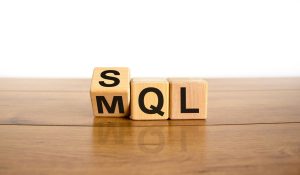
One frequently asked question in the dynamic and cutthroat B2B lead generation environment is, “Why is data quality so important?” The quick answer is that businesses gain valuable insights into their target audience, industry trends, and market dynamics by gathering, analyzing, and utilizing data. But there’s so much more.
In this article, we will look at the critical role of data in unveiling effective B2B lead generation solutions and how it enables businesses to make more informed decisions, improve customer targeting, and ultimately drive revenue growth.
What is B2B Lead Generation?
It is the process of capturing the attention of intent-rich leads to contact and nurture them for sales.
It begins when sales and marketing teams employ a range of B2B lead generation strategies to pique the target market’s interest and lead prospects through the sales funnel.
Although lead generation is typically considered part of a company’s advertising efforts, it is not just limited to paid advertising channels. Currently, the majority of businesses combine it with:
- Event marketing
- Pay-per-click advertising
- Cold calling
- Website optimization
- Social media promotion
- B2B email marketing
- Content marketing
Successful lead generation depends on having accurate and current information about potential clients, which is only possible with B2B data quality.
What is B2B Data Quality?
Data quality refers to the current state of your dataset and how well it serves its purpose. A dataset with high data quality assurance is deemed suitable for meeting business needs.
There are three primary sources to get B2B data:
- Social media
- Websites
- Paid vendors
We understand why data quality is important while looking through these three sources.
With a vast ocean of data, only the relevant and data-driven B2B approach will help companies improve their targeting and generate more leads.
Furthermore, it enables businesses to optimize their marketing spending and increase their ROI, making it a critical component of B2B prospecting.
Also Read: Overcoming Common Data Quality Challenges
Let’s see a short differentiation to know in-depth:
| High-quality Data | Low-quality Data |
|---|---|
| Accurate | Disorganized |
| Relevant | Inconsistent |
| Unique | Incomplete |
| Updated | Open to security flaws |
| Valid | Non-compliant data |
We must be aware of the importance of B2B data quality because, without it, businesses risk wasting resources on leads that aren’t likely to convert.
Why is Quality Data Important to Successfully Drive B2B Lead Generation
Data quality is a broad term encompassing many interconnected data processes, which directly and indirectly assist in B2B lead generation. Here are some of the processes:
Data Profiling: It reviews and cleanses data to maintain an organization’s data quality standards.
Data Integrity: It focuses on data accuracy, consistency, and completeness. It also casts more light on data security, preventing data corruption from malicious actors.
Data Analysis: It generates valuable data that identifies where to direct marketing resources. It assists in creating effective campaigns aimed at attracting and establishing relationships with prospective customers that lead to B2B sales-qualified leads.
Data Reliability: It helps to contact potential customers with a personalized message that addresses their needs, pain points, and interests. Accurate and relevant contact information is critical in B2B lead generation.
By employing effective B2B data solutions, sales and marketing teams can target the right markets and audiences to increase lead generation and lead quality and make data-driven decisions.
With the help of the points mentioned above, we can better understand what is B2B data quality and why it is important in actuality. It improves lead generation accuracy, targeting, personalization, relevance, credibility, and cost efficiency.
It also plays a significant role in making meaningful connections, increasing conversion rates, and running effective lead-generation campaigns.
B2B Data Quality Role to Gain Success in B2B Lead Generation Campaigns
Data quality plays a crucial role in B2B lead generation. It directly impacts the success and productivity of lead generation efforts.
Maintaining accurate and relevant contact information and sourcing B2B data are critical success factors. Let’s go over some pointers for making the most of these.
A] Tips for keeping contact information up to date and relevant
Ensuring the accuracy and relevance of your contact data is vital for successful B2B lead generation. Here are some valuable tips to help you maintain precise and up-to-date contact information:
1. Make use of a data verification tool
A data verification tool can help ensure you collect accurate data from the beginning. These tools can verify the following:
- Email addresses
- Phone numbers
- Mailing addresses
- Other relevant fields in real-time
Data validation tools or APIs can assist in automating this process and flagging any incorrect or incomplete data.
2. Do segmentation
Try to segment your database by:
-
- Industry
- Size
- Job title
- Tenure
- Department
- Geographic location
It can assist you in developing more targeted marketing campaigns. You can improve the effectiveness of your lead generation efforts by tailoring your message to specific segments of your audience.
3. Utilize social media
LinkedIn and Twitter, for example, can be practical tools for verifying contact information. You can ensure accurate and relevant information by cross-referencing your contact database with social media profiles.
Read More: How to Ensure Quality Data for AI Algorithms
4. Perform data cleaning
Regularly perform data cleansing activities to detect and eliminate duplicated, obsolete, or irrelevant contacts from your database. This streamlines your data and guarantees that your attention is directed toward active and pertinent leads.
5. Engage with contacts regularly
Maintain continuous communication with your contacts via email marketing, newsletters, webinars, or other forms of engagement.
It assists you in identifying inactive or unresponsive contacts who should be removed or re-engaged.
B] Tips for sourcing quality B2B data
When looking for high-quality B2B data, ensure you get accurate, up-to-date, and relevant information. Here are some suggestions:
- Before crafting any data strategy, ensure you have access to accurate and complete data.
- B2B data can quickly become outdated due to changes in company, personnel, or contact information. Look for providers with regular updates and a system to ensure data freshness.
- Check that the data provider follows privacy regulations and ethical data collection processes by:
- Inquiring about their data sourcing methods
- Consent mechanisms
- Following relevant data protection regulations, such as the GDPR or CCPA
The importance of data quality in generating B2B leads must be considered. Features of high-quality B2B data play a tactical role that can result in significant gains and give a competitive advantage in the B2B market.
Substantial Benefits of Data Quality in Generating Leads
Data quality has numerous significant advantages. Businesses can improve operational efficiencies, optimize marketing initiatives, and increase customer satisfaction with the help of good B2B data:
| What B2B Data Offers | Actual Benefits We Get | |
|---|---|---|
| 1) |
|
Better customer insights and targeting |
| 2) |
|
Increases the efficiency of lead generation activities |
| 3) |
This results in:Personalization > Increases engagement > Boosts conversion rate |
Enriches performance of both sales and marketing |
| 4) |
|
Helps to make informed decisions |
| 5) |
|
Helps to attain cost efficiency |
Knowing the advantages of B2B data quality assists you in locating opportunities for data quality improvement. We must outsource or collect B2B quality data depending on our particular needs and desires.
Outsourcing B2B Data Vs. Collecting B2B Data Yourself: Which One is Best?
The decision to outsource data quality or collect B2B data yourself is determined by your specific business requirements, available resources, data quality requirements, and compliance considerations.
Let’s have a clear understanding of the two with the help of examples.
Scenario 1: (Outsourcing B2B data)
Assume you own a software company that offers businesses customer relationship management (CRM) solutions. You want to broaden your customer base and target manufacturing companies. To effectively reach out to these potential customers, you must have accurate and up-to-date high-quality B2B contact data, such as company names, contact information, industry classification, and other pertinent information.
In this case, outsourcing B2B data can provide several benefits:
- Companies can save money on infrastructure, software licensing, and staffing.
- When a company grows or customer demands change, an outsourced data provider will quickly adjust resources, functionality, and support to accommodate these changes.
- Companies that outsource data can gain access to advanced features, analytics, automation, and integration capabilities without making large upfront investments.
- Prices remain constant regardless of plan or strategy changes.
Scenario 2: (Collection of B2B data oneself)
Consider a company that offers marketing services to other businesses. They want to collect real-time B2B data to create targeted marketing campaigns and identify potential leads.
In this case, collecting B2B data can provide several benefits:
- Internally collecting and managing B2B data gives you greater control over data security and regulatory compliance. You can implement robust data protection and ensure compliance with privacy laws.
- It will be possible for you to customize the process completely.
- While some initial costs may be associated with establishing data collection processes, collecting B2B data on your own can be cost-effective in the long run.
- Prices will depend on various factors associated.
Finally, many businesses use a hybrid approach, combining outsourced data with data collected internally. It helps balance efficiency, customization, and control.
Conclusion
We’ve discussed why data quality is important and encountered its necessity in the vast ocean of B2B. Creating a data-driven buyer persona increases your chances of reaching a targeted group of people who need and want your service.
Finally, B2B data solutions are advantageous in developing customer relationships, brand loyalty, and long-term profitability. Binary Demand is a case in point that has all the essential B2B data solutions to propel your business to new heights.











